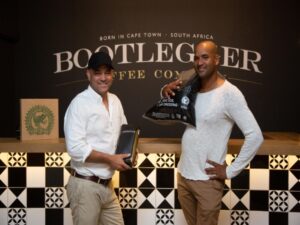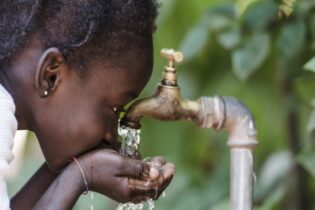South African coffeehouse, Bootlegger Coffee has partnered with food waste management specialist company Ywaste, to turn its waste into compost.
Bootlegger Coffee Company’s customers can now buy their gardening essentials along with their cappuccino, as the company has partnered with a food waste management specialist to turn its waste into compost. South Africa’s municipal landfills are rapidly running out of airspace, and the solution is recycling, said co-founder and director of Bootlegger Coffee Company, Pieter Bloem. “We want to play our part to help the country avoid reaching day zero for landfill airspace. So, now our customers can up their eco-friendly street credibility by buying bags of Bootlegger topsoil, potting soil and compost made with their used coffee grounds and organic food waste for just R40 for a bag,” Bloem said. Bootlegger has engaged Ywaste’s services, who provide an eco-friendly methodology for the management of food waste through off-site composting. Ywaste has diverted 5 600 tonnes of waste from landfill in the past 11 years. Healthy soils are fundamental to survival, seeing as they are essential for healthy plant growth, nutrition, water filtration and also help to regulate the climate and store carbon. “At the same time that we are focused on improving soil quality, we are helping government with their zero waste to landfill goals. The benefit of using coffee grounds as a fertiliser is that it adds organic material to the soil, which improves drainage, water retention and aeration in the soil,” said owner of Ywaste, Emile Fourie. Bootlegger has always had a community-centric focus, using beans which are 100% sustainably sourced and roasted at their micro-roastery in Woodstock, and are proudly 100% Rainforest Alliance Certified – meaning all products and ingredients have been produced using methods that support the three pillars of sustainability: social, economic, and environmental. “We would like to encourage other restaurants to also avoid landfilling, make the switch and make a difference in their communities with similar sustainable and eco-friendly approaches,” Bloem said.Currently 80% of Bootlegger franchisees are participating in the initiative, with more envisioned to come on board before year-end. Additionally, the coffeehouse has pledged that for every 10 bags of compost bought, Bootlegger will donate 1 bag of compost to a community food garden.
Environmental efforts Passionate about environmental issues, the Bootleggers philosophy is organic, real and solid. The group has introduced extensive measures to reduce their impact on the environment. They are one of the first restaurants to be fully Ocean Pledged Certified adhering to a strict set of environmental rules regarding material use in-store and for takeaways, food options, and alternatives as well as being water-wise. Their takeaway coffee cups are locally sourced, made from paper and are 100% biodegradable and compostable. Unlike other takeaway coffee cups who use plastic, their inside liner is made from corn starch and is thus 100% plant based. Their lids are made from recycled plastic. They implemented a #refusethelid initiative in 2017 which caused a drastic decline in their lid procurement amounts. In 2016 they launched a branded dash cup to promote and incentivize the use of reusable mugs. They also encourage clients to return all of the used Bootleggers pods to any of their stores which they then have recycled. No expanded polystyrene (EPS) foam (aka Styrofoam) is used in-store or for take-aways and no plastic bags are offered for take-aways. Only reusable tableware is used in-house, and take-away containers are made of paper, while take-away cutlery is made of corn starch. Additionally, only Bio-Degradable paper straws are used in their stores to reduce the impact plastic has on the environment. Read next: Shoprite Group to tackle food waste issue | Infrastructure news






